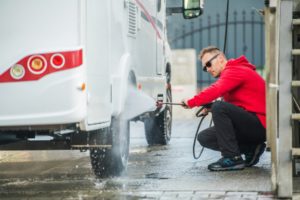
In this article, we will discuss how to wash an RV with a pressure washer. So let’s begin.
What Pressure Washer For RV?
Many pressure washers are divided into gas pressure washers and electric pressure washers. RVs should be washed with a low-power pressure washer that produces about 1100 to 1300 psi. Most gas pressure washers have about 3000 psi and are not suited for RV. only the low-power electrical models should be used to wash an RV; otherwise, it can damage the RV causing leaks or smashing the glass.
How To Pressure Wash The RV Camper?
The procedure to wash the RV camper is similar to the standard pressure washing procedure, but you must follow the instructions more carefully. First of all, the low power pressure washer is preferred; follow these steps:
- Rinse the RV with the water using the pressure washer in an up to down motion to prevent the streaking effect.
- Now fill the soap tank with the recommended detergent; make sure to use the detergent designed for RV washing.
- Use the low pressure tip to spray the detergent using the pressure washer. Let the detergent sit and react for at least 5 minutes.
- Scrub the detergent with some long scrubber and make sure that you do not go too harsh.
- Use the pressure washer to rinse the detergent from the surface using the water.
Cleaning the RV is an easy job if you follow the instructions, but you need to make sure that you follow all the precautions as well:
- Do not use the pressure washer on sensitive surfaces like tires, glass, or roofs. The water pressure can cause damage to the characters.
- Please do not use the pressure washer directly perpendicular to the surface as it causes the maximum pressure delivery to the surface with minimum dirt removal efficiency.
- Keep the pressure washer away from seals, vents, windows, and caulk.
- Do not use the pressure washer too close to the surface. A minimum of 18-inch distance should be maintained.
- Check the RV camper thoroughly for any damage, cracks, or paint removal. Mark or memorize these areas and avoid using the pressure washer on that part as high pressure can cause the damage to increase exponentially.
- Do not use the pressure washer to clean the air conditioner.
- Prevent the use of a pressure washer on the RV awning.
- Do not use the ladder or chair to reach the higher parts of the RV when you are using the pressure washer.
It is necessary to follow all the instructions and precautions; otherwise, thousands of dollars worth of damage could be caused by them, such as:
- Caulking in RV is exposed to constant weather and heat that can cause it to wear off and degrade. Using the pressure washer might remove or damage the caulking. Although it can be replaced if you know that it has been damaged.
- The high water pressure from pressure washers can cause the roof to leak or damage to the extent that leaks can occur shortly.
- Using the powerful pressure washer on RV might remove the paint and decals.
Conclusion
Using the pressure washer on the RV is easy if you follow all the instructions. Still, maximum precautions should be taken because the pressure washer can significantly damage the RV surface in the long term if not used properly. The ideal pressure to clean the RV is between 1100 and 1300 psi, and you should check the surface thoroughly to point out any cracks or damage. Using the pressure washer on a damaged surface will only worsen the situation.
- 10 Best Budget Pressure Washer 2023 – Reviews & Buyer’s Guide - December 7, 2022
- 10 Best Pressure Washer for Cars Wash Reviews [2023] - December 6, 2022
- 10 Best Commercial Pressure Washer 2023 –Buyer’s Guide - December 5, 2022
